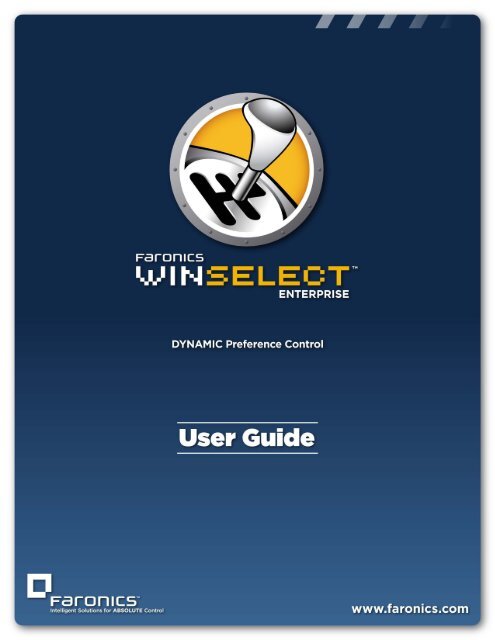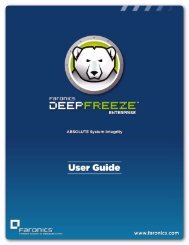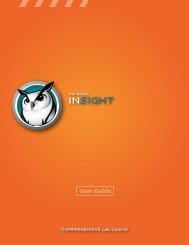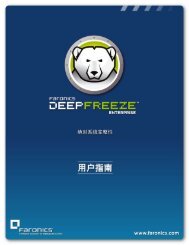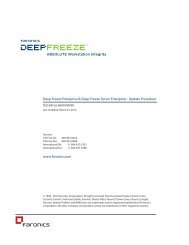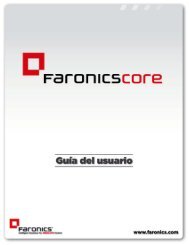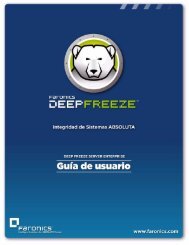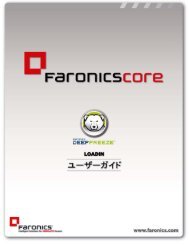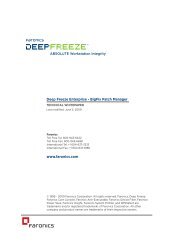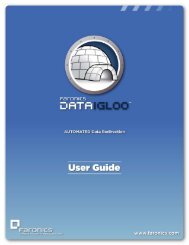Faronics WINSelect Enterprise User Guide
Faronics WINSelect Enterprise User Guide
Faronics WINSelect Enterprise User Guide
You also want an ePaper? Increase the reach of your titles
YUMPU automatically turns print PDFs into web optimized ePapers that Google loves.
Tis page has been lef blank intentionally
Contact Information<br />
Technical Support<br />
Every efort has been made to design this sofware for ease of use and to be problem free. If problems<br />
are encountered, contact Technical Support:<br />
Email: support@faronics.com<br />
Phone: 800-943-6422 or 604-637-3333<br />
Hours: 7:00am to 5:00pm (Pacifc Time)<br />
Contact Us<br />
Address: USA<br />
100, W. San Fernando Street, Suite 465<br />
San Jose, CA 95113, USA<br />
Phone: +1-800-943-6422<br />
Fax: +1-800-943-6488<br />
Europe<br />
8 The Courtyard, Eastern Road,<br />
Bracknell, Berkshire,<br />
RG12 2XB, England<br />
Phone: +44 (0) 1344 206 414<br />
Email: eurosales@faronics.com<br />
Web:<br />
Email:<br />
Canada<br />
1400-609, Granville Street, PO Box 10362<br />
Vancouver, BC V7Y 1G5 Canada<br />
Phone: +1-604-637-3333<br />
Fax: +1-604-637-8188<br />
www.faronics.com<br />
sales@faronics.com<br />
Singapore<br />
20 Cecil Street, #104-01 Equity<br />
Way, Singapore, 049705<br />
Phone: +65 6520 3619<br />
Fax: +65 6722 8634<br />
Email:<br />
internationalsales@faronics.com.sg<br />
Copyright<br />
Tis publication may not be downloaded, displayed, printed, or reproduced other than for non-commercial<br />
individual reference or private use within your/an organization. All copyright and other proprietary notices<br />
must be retained. No license to publish, communicate, modify, commercialize or alter this document<br />
is granted. For reproduction or use of this publication beyond this limited license, permission must be<br />
sought from the publisher.<br />
Last Modifed: January 2014<br />
© 1999 - 2014 <strong>Faronics</strong> Corporation. All rights reserved. <strong>Faronics</strong>, Deep Freeze, <strong>Faronics</strong> Core Console, <strong>Faronics</strong> Anti-Executable,<br />
<strong>Faronics</strong> Device Filter, <strong>Faronics</strong> Power Save, <strong>Faronics</strong> Insight, <strong>Faronics</strong> System Profler, and <strong>WINSelect</strong> are trademarks and/or registered<br />
trademarks of <strong>Faronics</strong> Corporation. All other company and product names are trademarks of their respective owners.<br />
3
Tis page has been lef blank intentionally
Contents<br />
<strong>Faronics</strong> <strong>WINSelect</strong> Overview ...........................................................................................................................7<br />
<strong>WINSelect</strong> Editions .......................................................................................................................................7<br />
Standard ....................................................................................................................................................7<br />
<strong>Enterprise</strong> ..................................................................................................................................................7<br />
System Requirements ....................................................................................................................................7<br />
Sofware .....................................................................................................................................................7<br />
Supported Programs .................................................................................................................................7<br />
<strong>Faronics</strong> Core Requirements ........................................................................................................................7<br />
<strong>WINSelect</strong> Installation Overview ......................................................................................................................8<br />
Installing <strong>Faronics</strong> Core Console .............................................................................................................8<br />
Installing <strong>WINSelect</strong> Loadin ....................................................................................................................8<br />
Installing/Upgrading <strong>WINSelect</strong> on a Workstation via <strong>Faronics</strong> Core Console ...................................10<br />
Applying the License on a Workstation via <strong>Faronics</strong> Core Console ......................................................10<br />
<strong>Faronics</strong> Licensing works as follows: ......................................................................................................10<br />
Installing <strong>WINSelect</strong> Manually on a Workstation .................................................................................10<br />
<strong>WINSelect</strong> Licensing .......................................................................................................................................14<br />
Confguring the <strong>WINSelect</strong> Loadin in the <strong>Faronics</strong> Core Console ................................................................14<br />
Retrieving Settings from the Workstation ......................................................................................................14<br />
Applying Settings in the <strong>Faronics</strong> <strong>WINSelect</strong> <strong>Enterprise</strong> Console .................................................................15<br />
<strong>WINSelect</strong> <strong>Enterprise</strong> Console ........................................................................................................................15<br />
System ..........................................................................................................................................................16<br />
Control Panel ..........................................................................................................................................17<br />
Desktop & Windows Taskbar ..................................................................................................................17<br />
Drives and File Extensions ......................................................................................................................18<br />
Start Menu ...............................................................................................................................................19<br />
Network Restrictions ...............................................................................................................................20<br />
Hotkeys ....................................................................................................................................................21<br />
Applications ................................................................................................................................................22<br />
Microsof Ofce .......................................................................................................................................23<br />
Menu ........................................................................................................................................................24<br />
Internet Browser......................................................................................................................................25<br />
Printers ........................................................................................................................................................27<br />
Acceptable Use Policy ..................................................................................................................................28<br />
Administrator ..............................................................................................................................................29<br />
Passwords ................................................................................................................................................29<br />
Protection ................................................................................................................................................29<br />
ADM Templates .......................................................................................................................................30<br />
<strong>User</strong> Session .............................................................................................................................................31<br />
<strong>WINSelect</strong> Templates ..............................................................................................................................33<br />
Using the <strong>WINSelect</strong> Kiosk Mode ...................................................................................................................34<br />
<strong>WINSelect</strong> Kiosk Panel ...............................................................................................................................35<br />
Scheduling Actions ..........................................................................................................................................36<br />
Appendix A: <strong>User</strong> Scenarios ............................................................................................................................37<br />
<strong>User</strong> 1—Library System Administrator ......................................................................................................37<br />
<strong>User</strong> 2—Corporate IT Administrator .........................................................................................................37<br />
Appendix B: Command Line Installation Options .........................................................................................38<br />
Appendix C: Uninstalling <strong>WINSelect</strong> ............................................................................................................39<br />
5
Tis page has been lef blank intentionally
<strong>Faronics</strong> <strong>WINSelect</strong> Overview<br />
About <strong>WINSelect</strong><br />
Controlling user activity on public use and kiosk computers is a problem that IT personnel continually<br />
face. IT administrators want a solution that allows them to easily manage user access to certain<br />
applications, web sites, and menu options so that they can infuence how a workstation is used. <strong>Faronics</strong><br />
<strong>WINSelect</strong> protects a computer’s purpose by empowering administrators with full control over a<br />
workstation’s abilities. Windows operating system features, Start menu functionality, Internet Explorer<br />
capabilities, and Windows Explorer options can all be heavily customized to suit organizational<br />
needs.<br />
<strong>WINSelect</strong> Editions<br />
Standard<br />
• <strong>WINSelect</strong> Standard Edition runs on a standalone workstation.<br />
<strong>Enterprise</strong><br />
• <strong>WINSelect</strong> <strong>Enterprise</strong> Edition provides centralized installation, deployment, administration,<br />
and control for multiple workstations on your network.<br />
About <strong>Faronics</strong> Core<br />
<strong>Faronics</strong> Core supports the monitoring and management of multiple workstations from a central<br />
location. Te <strong>Faronics</strong> Core displays the current status of managed workstations and allows commands<br />
to apply to one or more of those workstations. Advanced features include the ability to shutdown or<br />
restart computers, and centralized control over workstation protection settings.<br />
System Requirements<br />
Software<br />
• Windows XP Professional SP3 (32-bit or 64-bit), Windows Vista (32-bit or 64-bit), Windows<br />
7 (32-bit or 64-bit) or Windows 8.1 (32-bit or 64-bit)<br />
• <strong>Faronics</strong> Core 3.71 or higher<br />
Supported Programs<br />
• Microsof Ofce 2000, XP, 2003, 2007, 2010 and 2013<br />
• Internet Explorer 6, 7, 8, 9,10, and 11<br />
• Mozilla Firefox (upto version 20.0)<br />
<strong>Faronics</strong> Core Requirements<br />
Information on <strong>Faronics</strong> Core system requirements can be found in the <strong>Faronics</strong> Core user guide. Te<br />
latest user guide is available at http://www.faronics.com/library.<br />
7
<strong>WINSelect</strong> Installation Overview<br />
Installation and confguration of <strong>WINSelect</strong> involves the following steps:<br />
• Installing <strong>Faronics</strong> Core Console and generating/deploying the Workstation Agent installer<br />
• Installing and confguring the <strong>WINSelect</strong> Loadin<br />
• Deploying the <strong>WINSelect</strong> workstation installer fle<br />
Installing <strong>Faronics</strong> Core Console<br />
For information on installing the <strong>Faronics</strong> Core Console and generating and deploying the Workstation<br />
Agent installer, see the <strong>Faronics</strong> Core Console user guide.<br />
Prior to installing <strong>WINSelect</strong>, the Fast <strong>User</strong> Switching options for Windows XP, Vista, and Windows<br />
7 must be disabled. Refer to http://support.microsof.com/kb/279765 for more information.<br />
<strong>WINSelect</strong> must be disabled during the creation of a new <strong>User</strong> Profle. As part of <strong>WINSelect</strong><br />
protection, the registry editing tools will be disabled. Te administrator will have to disable<br />
<strong>WINSelect</strong> to use these tools.<br />
If a removable drive is connected during the <strong>WINSelect</strong> install, it is assigned a drive letter. It is<br />
recommended that removable drives be disconnected during installation to avoid unintentionally<br />
applying <strong>WINSelect</strong> settings.<br />
If Windows Group Policies are set on a workstation and <strong>WINSelect</strong> sets the same policy, <strong>WINSelect</strong><br />
will take precedence. If <strong>WINSelect</strong> does not duplicate the Group Policy setting, the Group Policy<br />
will not be afected.<br />
Installing <strong>WINSelect</strong> Loadin<br />
Te <strong>WINSelect</strong> Loadin is installed into <strong>Faronics</strong> Core Console using the <strong>WINSelect</strong>_Console_Loadin_<br />
Installer.exe fle. Te <strong>WINSelect</strong> Loadin cannot be installed on a system that does not already have<br />
<strong>Faronics</strong> Core Console installed.<br />
To Install the <strong>WINSelect</strong> Loadin, complete the following steps:<br />
1. Insert the CD-ROM from the Media Package into the CD-ROM drive. If <strong>WINSelect</strong> has been<br />
downloaded via the Internet, double-click the .exe fle to begin the installation process.<br />
Click Next to continue.<br />
8
2. Read and accept the License Agreement.<br />
Click Next to continue.<br />
3. Enter the <strong>User</strong> Name, Organization and the License Key. Select the Use Evaluation check box to<br />
install the evaluation version. Te evaluation version will expire in 30 days.<br />
4. Specify the install location and click Next. Te default is C:\Program Files\<strong>Faronics</strong>\<strong>Faronics</strong><br />
Core\Loadins\<strong>WINSelect</strong>. Click Change to change the location.<br />
4. Click Install to complete the installation.<br />
An immediate <strong>Faronics</strong> Core Console restart is recommended following installation.<br />
9
Installing/Upgrading <strong>WINSelect</strong> on a Workstation via <strong>Faronics</strong> Core Console<br />
You can install <strong>WINSelect</strong> on a workstation via <strong>Faronics</strong> Core Console. If you recently purchased an<br />
upgraded version of <strong>WINSelect</strong>, you can upgrade via <strong>Faronics</strong> Core Console.<br />
To install/upgrade <strong>WINSelect</strong>, select a single workstation or multiple workstations, click Confgure<br />
Workstations in the right pane and select Advanced > <strong>WINSelect</strong>>Install/Upgrade <strong>WINSelect</strong>.<br />
Te <strong>WINSelect</strong> dialog appears. Enter and confrm the Password. Click Install <strong>WINSelect</strong>.<br />
Applying the License on a Workstation via <strong>Faronics</strong> Core Console<br />
If you are using the evaluation version of <strong>WINSelect</strong>, you can apply the license and convert it to a full<br />
version. <strong>Faronics</strong> <strong>WINSelect</strong> License can be applied via <strong>Faronics</strong> Core Console. Complete the following<br />
steps to apply License:<br />
1. Launch <strong>Faronics</strong> Core Console.<br />
2. Right-click the Core Server and select Properties.<br />
3. Click the <strong>WINSelect</strong> tab. Te <strong>WINSelect</strong> tab displays the Version, License Key (if it is a Licensed<br />
Version), and License Expiry.<br />
4. To reboot the computer afer the user session, select the Reboot computer afer user session<br />
fnishes check box.<br />
5. Click Edit and enter the License Key in the License Key feld.<br />
6 Click Apply. Click OK.<br />
<strong>Faronics</strong> Licensing works as follows:<br />
• Te Core Server (a component of <strong>Faronics</strong> Core) automatically pushes the License Key to the<br />
workstations where <strong>Faronics</strong> <strong>WINSelect</strong> Client is installed (if the computers are ofine, the<br />
License Key is applied once the computers are back online).<br />
• Te License Key cannot be manually edited at the workstation.<br />
If the License Key was entered while installing the Loadin, it is not necessary to enter it again in<br />
the Properties tab.<br />
Installing <strong>WINSelect</strong> Manually on a Workstation<br />
When installing the <strong>WINSelect</strong> Loadin, the <strong>WINSelect</strong> workstation installer fles are unpacked in the<br />
C:\Program Files\<strong>Faronics</strong>\<strong>Faronics</strong> Core\Loadins\<strong>WINSelect</strong>\Workstation Installer directory. To install<br />
<strong>WINSelect</strong> on a workstation, double-click <strong>WINSelect</strong>_Ent_32-bit.msi on a 32-bit operating system.<br />
To install <strong>WINSelect</strong> on a workstation manually, do the following:<br />
10
1. Double-click on the .msi fle to begin the installation process.<br />
Click Next to continue.<br />
2. Read and accept the License Agreement.<br />
Click Next to continue.<br />
11
3. Enter the <strong>User</strong> Name, and Organization.<br />
Click Next to continue.<br />
4. Specify the install location and click Next. Te default is C:\Program Files\<strong>Faronics</strong>\<strong>WINSelect</strong>.<br />
12
5. Enter a <strong>WINSelect</strong> Administrator Password. Enter the password again to confrm. Click Next to<br />
continue.<br />
6. Click Next. Click Install to complete the installation.<br />
13
Once the Loadin has been successfully installed and <strong>Faronics</strong> Core Console restarted, a list of<br />
<strong>WINSelect</strong>-specifc actions are displayed in the Actions pane when one or more workstations have<br />
been selected.<br />
Te <strong>WINSelect</strong> actions are also available by selecting one or more workstations and using the rightclick<br />
contextual menu.<br />
• Console Tree: Te pane that allows you to select the <strong>Faronics</strong> Core Console node, workstations<br />
and groups, schedules tasks, and view generated reports.<br />
• Workstation List: Te pane that allows you to list workstations currently communicating<br />
with <strong>Faronics</strong> Core Console. Tis list also displays columns regarding workstation-specifc<br />
information.<br />
• Actions Pane: Te pane that allows you to enable, disable, and confgure <strong>WINSelect</strong> .<br />
<strong>WINSelect</strong> Licensing<br />
If no License Key is available, use the evaluation version of <strong>WINSelect</strong>. Te evaluation version is valid<br />
for 30 days. To upgrade to the full version of <strong>WINSelect</strong> enter a valid Licence Key in the About node.<br />
If no Key is entered afer 30 days, <strong>WINSelect</strong> is disabled on the workstation.<br />
Confguring the <strong>WINSelect</strong> Loadin in the <strong>Faronics</strong> Core Console<br />
To confgure the <strong>WINSelect</strong> for a workstation in the <strong>Faronics</strong> Core Console, click on Workstations ><br />
Managed Workstations and the workstation(s) for which you want to confgure <strong>WINSelect</strong>, and click<br />
Confgure <strong>WINSelect</strong>. Te <strong>Faronics</strong> <strong>WINSelect</strong> confguration screen appears.<br />
Retrieving Settings from the Workstation<br />
To retrieve settings from a selected workstation, click Retrieve. Only settings from a single workstation<br />
can be retrieved.<br />
To confgure multiple workstations with similar settings, import a <strong>WINSelect</strong> template from the<br />
Administrator node. For more information, refer to the section on <strong>WINSelect</strong> Templates.<br />
14
Applying Settings in the <strong>Faronics</strong> <strong>WINSelect</strong> <strong>Enterprise</strong> Console<br />
When the administrator modifes settings in the <strong>WINSelect</strong> <strong>Enterprise</strong> Console, the text for the node<br />
turns red to indicate that the administrator has made changes. To apply changes, click Apply, and then<br />
apply the settings only to the edited panes or to all the panes.<br />
<strong>WINSelect</strong> <strong>Enterprise</strong> Console<br />
Te About node of the <strong>WINSelect</strong> <strong>Enterprise</strong> Console appears as below:<br />
Te Console is comprised of a series of nodes grouped by common function allowing the administrator<br />
to customize the Windows environment and functionality.<br />
Te Kiosk node allows administrators to create a workstation with limited Windows functionality and<br />
enable key <strong>WINSelect</strong> features in only a few short steps.<br />
Te System node contains options which protect the computer and prevent unauthorized access<br />
to key Windows settings. Here, the administrator can prevent changes to system-wide Windows<br />
components.<br />
Te Applications node allows the administrator to customize the sofware found on the <strong>WINSelect</strong><br />
workstation. Use the Applications node to permit and restrict access to applications like Microsof<br />
Ofce and various Internet browsers.<br />
Te Printer node allows administrators to disable local and network printers.<br />
Te Acceptable Use Policy node allows administrators to set Acceptable <strong>User</strong> Policy and display it to<br />
workstation users.<br />
Te Administrator node allows users to enable and disable <strong>WINSelect</strong>, customize <strong>WINSelect</strong> settings<br />
such as the creation of user sessions, and add or change passwords. <strong>WINSelect</strong> templates can also be<br />
created.<br />
Click on any node to confgure the workstation.<br />
15
To apply changes in confguration in the Console for a single workstation, click Apply.<br />
If you select multiple workstations and change the confguration, click Apply Changes<br />
to apply only the changes in confguration to the selected workstations or click Apply<br />
All to apply the changes including the default settings to the selected workstations.<br />
System<br />
Te System node allows you to confgure the system-wide options.<br />
To disable the Task Manager, select Disable Task Manager. Tis prevents the user from accessing the<br />
Task Manager and ensures currently running tasks and processes can only be ended by an authorized<br />
user.<br />
Select Disable right-click to prevent users from accessing commands such as View, Paste, Copy, and<br />
Properties in Windows Explorer.<br />
Select Disable UNC (Uniform/Universal Naming Convention) Paths to prevent users from accessing<br />
shared network resources.<br />
Select Disable Folder Manipulation to prevent the renaming, moving, or deleting folders. Tis prevents<br />
users from renaming or changing the location of folders through Windows Explorer.<br />
Select Disable Drag-and-Drop to prohibit users from moving fles and folders to diferent locations.<br />
Tis option also disables selecting text and images by dragging the mouse pointer in all applications.<br />
Te Disable Task Manager and UNC paths options are automatically enabled and<br />
cannot be confgured when Kiosk mode is enabled.<br />
16
Control Panel<br />
Te Control Panel node provides options for restricting the display of Windows Control Panel applets.<br />
Windows Control Panel can be accessed but the icons may be selectively hidden.<br />
Some Control Panel settings can still be accessed and changed via a command line or the Run dialog.<br />
To permit access to the entire Control Panel, select Show Applets. Tis displays each applet found in<br />
the workstation’s Control Panel. To prevent access to every Control Panel applet select Hide all Applets.<br />
Show Applets and Hide all Applets do not allow for specifc applets to be allowed or restricted.<br />
To specify specifc applets click Hide selected Applets and select the check box next to the applet to be<br />
restricted. A cleared check box next to the applet signifes a displayed and accessible applet.<br />
To add an applet to the list, enter the applet name in the Specify Applet feld and click Add.<br />
To delete an applet, highlight it in the list and click Remove. A deleted applet still appears in Control<br />
Panel. It has only been removed from <strong>WINSelect</strong>’s list of Control Panel applets.<br />
Desktop & Windows Taskbar<br />
Te Desktop & Windows Taskbar node provides options for restricting the use of the workstation<br />
desktop and Windows Taskbar.<br />
17
Disable Right-click on Desktop prevents the user from right-clicking on the desktop. Tey will not be<br />
able to access the right-click menu and commands such as New and Properties.<br />
Disable Right-click on Desktop icons prevents the user from right-clicking on desktop icons. Tey will<br />
not be able to access commands such as Open. Te user will also not be able to delete shortcuts or<br />
rename them.<br />
Te two radio buttons Hide all icons and Hide selected icons dictate the desktop icons that can be<br />
hidden. <strong>WINSelect</strong> recognizes the desktop icons on the workstation and lists them. Hide selected by<br />
selecting the Hide selected Icons radio button and selecting the check box for each icon to be hidden.<br />
If Kiosk mode is enabled, changes to this node are not possible. Disabling right-click<br />
in the System node also disables the two Disable Right-click options in the Desktop<br />
& Windows Taskbar node.<br />
Drives and File Extensions<br />
Te Drives and File Extensions node provides options for restricting access to drives and specifed fle<br />
extensions for each application installed on the workstation.<br />
Choose the available drives and fle extensions to be disabled by selecting the check box next to each<br />
one. Use the Select All or Deselect All options if required.<br />
Files and directory structures are not visible once this feature is enabled. For example, if all drives are<br />
selected, exploring the directories contained within is not permitted. If there is no drive selected but a<br />
fle extension is selected, then the fle extension will be disabled across all drives.<br />
If the system drive is disabled, access to the user’s directory is not disabled by default. Select Disable<br />
access to user’s directory to prevent access. For example, if C: is listed as the system drive, selecting the<br />
check box next to C: makes the Disable access to user’s directory check box available. Te administrator<br />
can now choose to restrict the user to access the directory C:\Documents and Settings\<strong>User</strong> folder by<br />
selecting the check box. Te user will be able to access only the Desktop. Tis option is only made<br />
available when the system drive letter check box is selected. Clear the check box to allow users to save<br />
and create fles within their own directory.<br />
To prevent access to removable drives, select the check box for removable drives. Tis feature prevents<br />
the user from seeing any removable drives connected. To disable fle extensions from being used, select<br />
the desired extension. To add another fle extension to the list, enter the extension in the feld provided<br />
and click Add Extension.<br />
18
Once enabled, this feature prevents access to or creation of fles with the specifed extension.<br />
If a removable drive is connected during the <strong>WINSelect</strong> installation and confguration,<br />
it is assigned a drive letter. It is recommended that removable drives be disconnected<br />
during installation and confguration to avoid inadvertently applying <strong>WINSelect</strong><br />
settings to the removable drive.<br />
Start Menu<br />
Te Start Menu node provides options for restricting access to the workstation Start menu. Customize<br />
access to the Start menu by selecting one or more options.<br />
Enable Start button, when selected, allows the user access to the workstation’s Start button. Disable all<br />
Start menu items prevents the user from accessing the Start menu.<br />
Disable selected Start menu items by selecting the specifc items in the list. Te selected options will not<br />
be available the next time the Start menu is opened.<br />
Selecting the Disable right-click on Start Menu items option prevents a user from accessing the secondary<br />
menu.<br />
Selecting the Enable classic style Start Menu option enables the classic style Start menu with the look<br />
and feature-limited behavior of the Windows 2000 Start menu.<br />
Start Menu node in Windows 8<br />
On Windows 8 workstations, when <strong>WINSelect</strong> is launched directly on the workstation, only Log<br />
Of, Run, Shut Down and Control Panel, Printers and Network Connections will be displayed. When<br />
<strong>WINSelect</strong> is launched via <strong>Faronics</strong> Core Console by selecting a Windows 8 workstation, the above<br />
three options are displayed. Other options are marked (Unavailable for Windows 8).<br />
Each Start menu option is automatically disabled while Kiosk mode is enabled.<br />
19
Network Restrictions<br />
Te Network Restrictions node provides network restriction options. Administrators can limit access<br />
to specifc web sites with these options.<br />
To apply network restrictions on the workstation, select Enable.<br />
To restrict a specifc domain name, enter it in Specify the URL and click Add. Te name appears in the<br />
list.<br />
To restrict an IP address or a range of IP addresses, enter the addresses in the feld(s) provided and click<br />
Add. Te addresses appear in the listbox.<br />
If a range of addresses is specifed, each individual address within the range is either restricted or<br />
allowed depending on the radio button selected (Allow selected or Disallow selected).<br />
Select the Allow selected or Disallow selected radio buttons to specify the list behavior. Restrict or permit<br />
selected ranges or domain names based on which entries are selected. If Allow selected is selected, the<br />
selected list entry will be allowed. If Disallow selected is selected, the selected list entry will not be<br />
allowed.<br />
To remove an item from the listbox, select the item and click Remove.<br />
20
Hotkeys<br />
Te Hotkeys node provides options for restricting the use of specifed hotkeys at the system level.<br />
Key combinations that work in multiple applications can be disabled regardless which application is<br />
enabled on the workstation.<br />
Select the hotkeys on the list that will be disabled on the workstation. Click Select All or Deselect All to<br />
select or deselect all hotkeys.<br />
Hotkeys not listed can be added by entering the key combination and clicking the Add to List Button.<br />
Te Remove option only removes custom key combinations added by an administrator.<br />
21
Applications<br />
Te Applications node allows customizing of applications.<br />
Tis option is unavailable when Kiosk mode is enabled. If administrators wish to create a Windows<br />
environment featuring only specifc applications, but do not wish to create a <strong>WINSelect</strong> Kiosk, they can<br />
specify the desired applications on this node.<br />
To populate the list with all available .exe fles found within the Program Files folder, select List All<br />
Programs. Use the available options to select or deselect all applications, to list all applications, or to<br />
remove applications from the list.<br />
To add an individual application, click the Add button. Browse to the desired application’s .exe fle and<br />
click Open.<br />
Allow only specifc applications to run or to prevent specifc applications from running. Each application<br />
must have a selected check box next to it to dictate the list behavior. If an allowed application opens a<br />
second application, the second application must also be listed.<br />
A disallowed application is recognized by name, not location. If an application is specifed as disallowed<br />
then moved to a diferent folder, <strong>WINSelect</strong> will still prevent it from being opened.<br />
Selecting Applications from the Windows system folder may cause system instability.<br />
To remove an application, click the Remove button.<br />
22
Microsoft Offce<br />
Te Microsof Ofce node provides options for restricting access to Microsof Ofce menu items. Te<br />
administrative features of Microsof Ofce are listed to allow the administrator to prevent users from<br />
unauthorized manipulation of these settings.<br />
Select the menu items from the list that will restrict menu items of Microsof Ofce applications on the<br />
workstation. Select the menu items from the list and click Apply.<br />
Te following Microsof Ofce programs can be disabled by selecting the check box next to it:<br />
Disable Macros disables macros and the shortcut keys displayed.<br />
Disable VB Editor disables the macros, Visual Basic editor and the shortcut keys displayed.<br />
Disable Templates and Addins disables the Templates and Addins for Microsof Ofce.<br />
Disable execution of Visual Basic Applications disables the execution of Visual Basic programs.<br />
Disable Web disables the Web toolbar in Microsof Ofce.<br />
Disable detect and repair disables the Detect and Repair option in the Help menu.<br />
23
Menu<br />
Te Menu node provides options for restricting access to specifc menu items within selected<br />
applications.<br />
<strong>WINSelect</strong> will record the menu only for products that adhere to Microsof’s menu<br />
structure. Menus of products having a diferent menu structure will not be recorded<br />
properly.<br />
To record a menu to be restricted:<br />
1. Select a specifc application by clicking Record and browse to the executable fle (.exe). In the<br />
example below, the Wordpad application was selected.<br />
2. Open the menus to be restricted one at a time. Te <strong>WINSelect</strong> Menu Recorder records the<br />
selected menu.<br />
3. Close the application.<br />
24
<strong>WINSelect</strong> displays the .exe fle selected on the lef and the menu items the administrator opened on<br />
the right. Click on specifc menu commands within the tree structure to restrict individual commands<br />
within those menus.<br />
Once enabled, the user will be able to access the commands within the application but will not be able<br />
to use them.<br />
Changes cannot be made to a set of menu commands once they have been selected.<br />
Te .exe fle must be deleted from the menu list and the process repeated.<br />
Menu commands for Microsof Ofce cannot be recorded.<br />
Internet Browser<br />
Te Internet Browser node provides options for restricting access to Internet browser functions and<br />
menus. Enable these features when users are required to access the Internet, but are not permitted to<br />
save locations, print pages, access the favorites menu, etc.<br />
25
Disable right-click functionality by selecting the Disable right-click check box. Tis prevents the user<br />
from accessing right-click menus and prevents the saving of links or the copying of addresses.<br />
To prevent access to fles stored on a network, choose Prevent opening of fles or folders from address bar.<br />
Tis prevents the user from opening documents on local drives or Internet directory locations.<br />
Specify the workstation’s browser home page in the space provided. Tis is the web page displayed each<br />
time the browser is opened. Tis overrides the home page specifed within the Internet browser.<br />
Select a browser from the list and select the menu items to be disabled in that browser. Menus such as<br />
File, View, and Favorites can be selected, which prevents the user from accessing them.<br />
Entire menus can be disabled along with individual commands within menus. Select the check box<br />
next to the top level to disable an entire menu, or click to expand the menu and select the individual<br />
check boxes to disable the commands found within.<br />
Select the Disable Favorites menu of Internet Explorer check box to disable the saved list of frequently<br />
visited web sites. Te user will not be able to view the Favorites list and bookmark new favorite web<br />
pages.<br />
Te Disable right-click, Disable Menu (or sub-menu items), and Disable Context<br />
Menu (or sub-menu items) will gray out the menu or the sub-menu items as selected.<br />
Te menu or the context-menu will still be visible, but options cannot be selected<br />
once disabled.<br />
26
Printers<br />
Te Printers node provides options for restricting access to any available printers connected to the<br />
workstation. Te list of printers for the workstation is displayed. Use this feature to restrict printers<br />
entirely, or to permit users to print a specifc amount of material on one or more selected printers.<br />
Access to ofine printers can be restricted. Tis is useful to remember since ofine printers can still<br />
receive printing jobs.<br />
Select one of the three options available for confguring printer access. Enable print quota does not<br />
disable any printing capabilities. It only places a restriction on the number of pages a user can print<br />
from the workstation. If you choose to specify a printing quota, enter the number of pages per session<br />
in the box provided. Entering 0 (zero) denotes no limit.<br />
Disable all restricts printing from each printer that has been added to the workstation. To disable<br />
selected printers only, select the specifc printers on the list and select Disable selected.<br />
For more information on adding and connecting printers consult your Windows documentation.<br />
27
Acceptable Use Policy<br />
Te Acceptable Use Policy node allows for display of an Acceptable Use Policy (AUP) at the start up of<br />
the workstation. Tis feature allows the administrator to specify the conditions of use each time a user<br />
logs into a workstation. Te user must accept this policy before using the workstation.<br />
Tere is no fle size restriction and only fles with the .rtf extension can be imported.<br />
To enable this feature, select Display AUP at workstation start up. Once this setting is enabled, the user<br />
will not be able to access the workstation without accepting the policy.<br />
Click Import and browse to the location of an .rtf fle that has the AUP text.<br />
<strong>WINSelect</strong> does not enforce statements made in imported Acceptable Use Policy.<br />
28
Administrator<br />
Te Administrator node is used to change passwords required by administrators, and to enable or<br />
disable <strong>WINSelect</strong>.<br />
Passwords<br />
To set a new password, type the new password in the New password feld. Enter and confrm the new<br />
password. Click Apply to apply the new password. Te password initially set following the <strong>WINSelect</strong><br />
install is replaced by the new one. Only one administrator password can be set.<br />
Protection<br />
Choose Enable <strong>WINSelect</strong> to enable <strong>WINSelect</strong> on the workstation, and if <strong>WINSelect</strong> is disabled for<br />
administrators.<br />
If Disable <strong>WINSelect</strong> for Administrators is selected, the restrictions specifed in <strong>WINSelect</strong> will not<br />
apply to users who log in using an administrator password.<br />
29
ADM Templates<br />
Te Active Directory Management (ADM) Template node provides the option to import and confgure<br />
.adm templates. Since <strong>WINSelect</strong> provides administrators with an interface to edit Group Policy<br />
settings, administrators can create their own .adm templates to supplement <strong>WINSelect</strong>’s features.<br />
For more information consult the Microsof support article regarding Active Directory Management.<br />
Select Import to add an .adm fle. Windows Vista users can import .admx fles as well. Importing an<br />
.adm (or .admx) template creates a <strong>WINSelect</strong>.adm fle located in C:\WINDOWS\inf.<br />
Once an .adm fle has been opened, select Confgure to open the Group Policy Editor where changes<br />
can be made.<br />
Deleting the ADM template does not remove the applied settings. It only removes the template from<br />
the <strong>WINSelect</strong> Control Panel. Changes must be made by selecting Confgure or through the Windows<br />
Registry Editor.<br />
Te ADM template can be confgured only on the workstation. Only one ADM<br />
template can be active at a time.<br />
30
<strong>User</strong> Session<br />
Te <strong>User</strong> Session node provides the option to create user sessions that are limited in duration. Tis<br />
allows the administrator to specify the amount of time a user can spend logged into a workstation.<br />
To enable the <strong>User</strong> Session feature, ensure Enable is selected and perform the following steps:<br />
1. Choose the Duration of <strong>User</strong> Session in minutes for the session from the drop-down. Time<br />
values range from 15 minutes to 120 minutes.<br />
2. Choose how many session codes to be created from the Number of codes to generate dropdown.<br />
Count values range from 1 to 100.<br />
3. To display a warning select the Show warning message x minutes before the session expires check<br />
box. Specify a value for x between 1 and the lowest user session -1. For example, if you have<br />
selected three sets of user sessions with duration 15, 30, and 60 minutes, the warning must be<br />
between 1 and 14.<br />
4. To reboot the computer afer the user session, select the Reboot computer afer user session<br />
fnishes check box.<br />
5. Click Generate Codes.<br />
6 Click OK.<br />
<strong>WINSelect</strong> Protection has to be Enabled for the <strong>User</strong> Session settings to be applied. If<br />
<strong>WINSelect</strong> Protection has not been enabled, select the Enable <strong>WINSelect</strong> check box<br />
in the Administrator node.<br />
Afer the Windows logof (to apply the new settings) the next user to use the workstation is prompted<br />
to enter a generated code at the beginning of the user session:<br />
31
If you are the administrator, you can select the Administrator check box. Te <strong>WINSelect</strong> login screen<br />
is displayed. You can enter the administrator password to launch <strong>WINSelect</strong> in Administrator mode. If<br />
you are logged in as the workstation user, and the session reaches its allotted time, a dialog will appear<br />
asking for a new code to be entered. Te user will not be able to use the workstation until the new code<br />
has been entered. If a new code is not entered, the session will expire. Once a code has been used, it is<br />
automatically removed from all workstations on the network. If you login as an administrator, the user<br />
session never expires.<br />
Afer logging on to the computer using the code, the following status bar is displayed at the top of the<br />
screen.<br />
If the Show warning message x minutes before the session expires check box is selected in the <strong>User</strong><br />
Session node, a warning is displayed x minutes before the expiry of the session.<br />
Click Snooze and select the number of minutes from the drop-down. Click OK. Te warning will be<br />
displayed again afer the selected duration.<br />
If you do not want the warning to appear again, click Do not show message again and click OK.<br />
Administrators can create multiple codes for multiple session lengths within this node. If only one<br />
code needs to be printed, right-click the code and select Print.<br />
To remove an individual code, right-click on it and select Remove. To remove a group of codes, rightclick<br />
the frst node in the list and select Remove.<br />
Click Copy all Codes to copy all the generated codes to the clipboard. You can launch the program of<br />
your choice and paste the codes.<br />
Click Print all Codes to print all the generated codes using the default printer.<br />
32
<strong>WINSelect</strong> Templates<br />
Te <strong>WINSelect</strong> Templates node provides the option to export all confgured <strong>WINSelect</strong> settings as a<br />
<strong>WINSelect</strong> template. Tis template can then be deployed to any number of workstations protected by<br />
<strong>WINSelect</strong>.<br />
It is saved as a proprietary fle format and can only be opened by <strong>WINSelect</strong>.<br />
To create a <strong>WINSelect</strong> template, select all the settings that are to be part of the template in the list<br />
of <strong>WINSelect</strong> nodes. Use the Select All or Deselect All options as required. Click Export, browse to a<br />
location to save the template, and save it with a unique name.<br />
To import a <strong>WINSelect</strong> template, click Import and browse to the location of the preferred template.<br />
33
Using the <strong>WINSelect</strong> Kiosk Mode<br />
Tis setting allows administrators to create a kiosk type workstation where only specifed executables<br />
can be run. It also disables access to the Start button and Windows Taskbar. To access the Kiosk mode,<br />
click on the Kiosk node in the lef pane of the Administrative Console.<br />
To create a Kiosk workstation, select Enable in the <strong>WINSelect</strong> Kiosk Panel.<br />
To add an application, click Add and enter any executables that are active on the workstation. Once<br />
added to the list, these applications are available to the workstation user. Any application with a selected<br />
check box next to it will appear maximized on screen following a restart. Applications without a selected<br />
check box next to it will still be available and can be accessed through the <strong>WINSelect</strong> Kiosk Panel. Te<br />
applications added to the Kiosk Panel should remain open till the settings are applied in <strong>WINSelect</strong>.<br />
Select the Exclude automatically launched applications from Kiosk Launcher check box to exclude<br />
certain applications from the Launcher.<br />
Select the Maintain current size and position for application windows check box to specify the window<br />
size and desktop placement for enabled applications. If this option is selected, the specifed applications<br />
will open immediately and the administrator can set the size and position by clicking and dragging<br />
window frame edges.<br />
Desktop shortcuts cannot be added to the list of applications; the executable itself<br />
must be added.<br />
Tere are three ways which a <strong>WINSelect</strong> Kiosk can function:<br />
• One or more maximized applications: Tese can be selected using the Windows Taskbar.<br />
Enable these by selecting a series of applications using the Add button and selecting the check<br />
box next to each added application.<br />
• Applications selected but not maximized: Applications can be accessed from the <strong>WINSelect</strong><br />
Kiosk Panel. Confgure by selecting a series of applications using the Add button and leaving<br />
the check boxes cleared. Te user can launch these applications using the <strong>WINSelect</strong> Kiosk<br />
Panel.<br />
34
• Applications selected, size specifed, and placed by the administrator: Confgure by selecting<br />
a series of applications and selecting the Maintain current size and position box for application<br />
windows check box.<br />
Te Kiosk panel is minimized to the Taskbar upon startup.<br />
To remove an executable from the Kiosk list, select it and click Remove.<br />
When Kiosk Mode is enabled the following settings are automatically applied and cannot be disabled:<br />
• Task manager is disabled<br />
• Right-click is disabled on Taskbar and Start Menu<br />
• Taskbar icons are hidden (System Tray, clock)<br />
• Start button is completely disabled<br />
• Applications are disabled<br />
• All UNC (Universal Naming Convention) paths are disabled<br />
• Printing is blocked on Internet Explorer and Firefox<br />
Click Apply to save the changes and create the Kiosk settings. A logof is required for changes to take<br />
efect.<br />
<strong>WINSelect</strong> Kiosk Panel<br />
When the <strong>WINSelect</strong> Kiosk is active on a workstation, the selected applications appear in the <strong>WINSelect</strong><br />
Kiosk Panel. By default, this panel is minimized to the Taskbar on startup. Click on the Taskbar to<br />
maximize the <strong>WINSelect</strong> Kiosk panel.<br />
35
Scheduling Actions<br />
<strong>WINSelect</strong> actions can be scheduled through <strong>Faronics</strong> Core Console to occur on one or many<br />
workstations on a one-time, daily, weekly, or monthly basis. Actions that can be scheduled are: Shutdown,<br />
Restart, Wakeup, Enable Protection and Disable Protection.<br />
To choose an action, click Schedule Action in the right pane and choose the preferred action from the<br />
menu, as shown:<br />
Alternatively, right-click on the selected workstation, select Schedule Action in the contextual menu,<br />
and select the preferred action.<br />
Each schedule option has diferent confguration options, depending on the frequency of the action,<br />
as shown:<br />
To execute a task one time only, choose the One Time radio button.<br />
Enter the time and date when the task will execute.<br />
Click OK to complete the scheduling of the task or Cancel to exit the dialog.<br />
36
Appendix A: <strong>User</strong> Scenarios<br />
Te following two user scenarios outline possible <strong>WINSelect</strong> confgurations according to the tasks the<br />
workstation will be used to accomplish. Other scenarios are possible as well.<br />
<strong>User</strong> 1—Library System Administrator<br />
Workstation Functionality<br />
<strong>User</strong>s are provided to access the Internet, the<br />
library card catalog, and limited word processing<br />
capabilities.<br />
<strong>User</strong>s are prevented from using chat or email<br />
applications.<br />
An existing content flter is in place to block<br />
inappropriate web sites and other web based<br />
games or applications.<br />
<strong>User</strong>s are limited to 30 minutes of computer<br />
time per session.<br />
<strong>User</strong>s can print only a specifed number of pages<br />
per session.<br />
Suggested Confguration<br />
Enable Kiosk mode with the following applications:<br />
Internet Explorer (IEXPLORE.EXE).<br />
Microsof Word (WINWORD.EXE).<br />
Set Internet Explorer as the default, maximized<br />
application upon start up.<br />
Apply an Acceptable Use Policy message indicating<br />
what is allowed on the workstation.<br />
Enable <strong>User</strong> Sessions with a generated set of access<br />
codes.<br />
Enable printer restrictions and set a specifc limit<br />
on the pages printed.<br />
<strong>User</strong> 2—Corporate IT Administrator<br />
Workstation Functionality<br />
<strong>User</strong>s require access to Microsof Ofce suite.<br />
<strong>User</strong>s require access to email and their network<br />
folder to save information to.<br />
<strong>User</strong>s need to be prevented from saving to,<br />
or accessing any location on the C:\ drive,<br />
including their own profle.<br />
<strong>User</strong>s should not have any games installed on<br />
the workstation.<br />
Internet access should be unfltered.<br />
Suggested Confguration<br />
Confgure System node to prevent access to the<br />
Task Manager, and to disable UNC path.<br />
Confgure the Applications and Internet Browser<br />
nodes to prevent opening of fles or folders from<br />
the address bar.<br />
In the Applications node confgure to block any<br />
applications that should not be run (games).<br />
Confgure drives and fle extensions to prevent<br />
access to C:\<br />
Confgure Start menu to use classic layout and<br />
disable any applications that are not required for<br />
day to day operation.<br />
Confgure Control Panel to hide all applets.<br />
Hide all desktop icons.<br />
37
Appendix B: Command Line Installation Options<br />
Command line installation options ofer increased fexibility in installing <strong>WINSelect</strong>. Te following<br />
functions and commands are available:<br />
Function<br />
Silent install<br />
Command<br />
msiexec /q /i [path]<strong>WINSelect</strong>_Ent_32-bit.msi<br />
WSADMINPSW=[password] WSADMINCONFIRMPSW=[password]<br />
Silent install<br />
(Evaluation<br />
version)<br />
WSUSEEVAL=1<br />
Silent uninstall<br />
[path]: location of the <strong>WINSelect</strong> executable<br />
msiexec /q /i [path]<strong>WINSelect</strong>_Ent_32-bit.msi<br />
WSADMINPSW=[password] WSADMINCONFIRMPSW=[password]<br />
msiexec /q /x [path]<strong>WINSelect</strong>_Ent_32-bit.msi<br />
38
Appendix C: Uninstalling <strong>WINSelect</strong><br />
Uninstalling the <strong>WINSelect</strong> Loadin<br />
Te <strong>WINSelect</strong> Loadin can be uninstalled through Add or Remove Programs. To do so click on<br />
Start>Control Panel> Add or Remove Programs > <strong>Faronics</strong> <strong>WINSelect</strong> Loadin > Remove. Uninstalling<br />
the <strong>WINSelect</strong> Loadin will remove all <strong>WINSelect</strong> management capabilities from <strong>Faronics</strong> Core<br />
Console. It will not remove <strong>WINSelect</strong> installations from the individual workstations.<br />
Uninstalling <strong>WINSelect</strong> on a Workstation Using <strong>Faronics</strong> Core Console<br />
<strong>WINSelect</strong> can be removed from a workstation using <strong>Faronics</strong> Core Console.<br />
1. Open <strong>Faronics</strong> Core Console.<br />
2. Click on Workstations > Managed Workstations in the lef pane of the Console.<br />
3. Right-click on the workstation(s) from which <strong>WINSelect</strong> will be removed.<br />
4. Click on Confgure workstations > Advanced > Uninstall <strong>WINSelect</strong><br />
Uninstalling on an Individual Workstation Using the Uninstall Wizard<br />
To perform a <strong>WINSelect</strong> uninstall, click the Administrator node and ensure the<br />
Enable box is not selected.<br />
<strong>WINSelect</strong> can be removed by double-clicking on the .msi fle used to install <strong>WINSelect</strong>. Te Setup<br />
Wizard appears:<br />
1. Launch the <strong>WINSelect</strong> installer <strong>WINSelect</strong>_Ent_32-bit.msi. Te uninstall wizard appears,<br />
asking for confrmation of the uninstall.<br />
2. Restart the workstation to complete the uninstall.<br />
Te administrator must log out of Windows and log back in at least once to complete<br />
the uninstall.<br />
39


